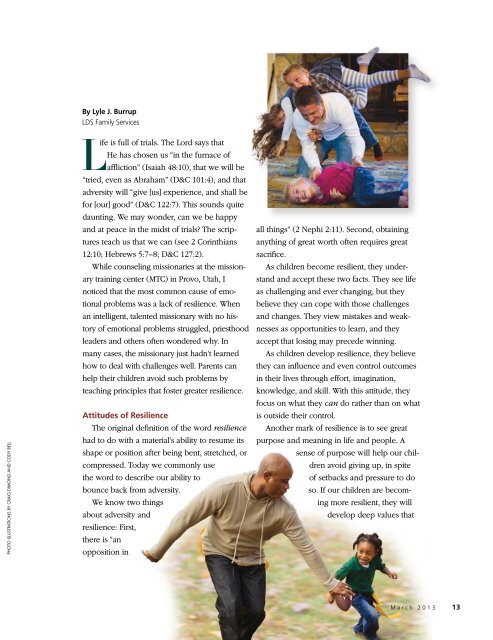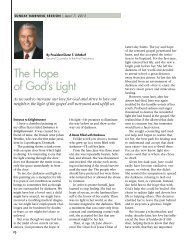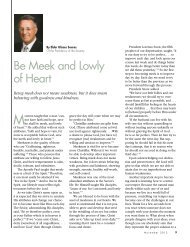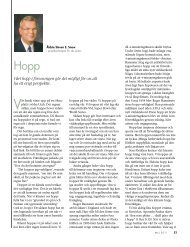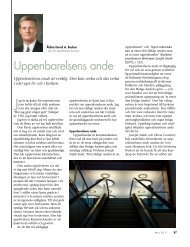March 2013 Ensign - The Church of Jesus Christ of Latter-day Saints
March 2013 Ensign - The Church of Jesus Christ of Latter-day Saints
March 2013 Ensign - The Church of Jesus Christ of Latter-day Saints
You also want an ePaper? Increase the reach of your titles
YUMPU automatically turns print PDFs into web optimized ePapers that Google loves.
PHOTO ILLUSTRATIONS BY CRAIG DIMOND AND CODY BELL<br />
By Lyle J. Burrup<br />
LDS Family Services<br />
Life is full <strong>of</strong> trials. <strong>The</strong> Lord says that<br />
He has chosen us “in the furnace <strong>of</strong><br />
affliction” (Isaiah 48:10), that we will be<br />
“tried, even as Abraham” (D&C 101:4), and that<br />
adversity will “give [us] experience, and shall be<br />
for [our] good” (D&C 122:7). This sounds quite<br />
daunting. We may wonder, can we be happy<br />
and at peace in the midst <strong>of</strong> trials? <strong>The</strong> scriptures<br />
teach us that we can (see 2 Corinthians<br />
12:10; Hebrews 5:7–8; D&C 127:2).<br />
While counseling missionaries at the missionary<br />
training center (MTC) in Provo, Utah, I<br />
noticed that the most common cause <strong>of</strong> emotional<br />
problems was a lack <strong>of</strong> resilience. When<br />
an intelligent, talented missionary with no history<br />
<strong>of</strong> emotional problems struggled, priesthood<br />
leaders and others <strong>of</strong>ten wondered why. In<br />
many cases, the missionary just hadn’t learned<br />
how to deal with challenges well. Parents can<br />
help their children avoid such problems by<br />
teaching principles that foster greater resilience.<br />
Attitudes <strong>of</strong> Resilience<br />
<strong>The</strong> original definition <strong>of</strong> the word resilience<br />
had to do with a material’s ability to resume its<br />
shape or position after being bent, stretched, or<br />
compressed. To<strong>day</strong> we commonly use<br />
the word to describe our ability to<br />
bounce back from adversity.<br />
We know two things<br />
about adversity and<br />
resilience: First,<br />
there is “an<br />
opposition in<br />
all things” (2 Nephi 2:11). Second, obtaining<br />
anything <strong>of</strong> great worth <strong>of</strong>ten requires great<br />
sacrifice.<br />
As children become resilient, they understand<br />
and accept these two facts. <strong>The</strong>y see life<br />
as challenging and ever changing, but they<br />
believe they can cope with those challenges<br />
and changes. <strong>The</strong>y view mistakes and weaknesses<br />
as opportunities to learn, and they<br />
accept that losing may precede winning.<br />
As children develop resilience, they believe<br />
they can influence and even control outcomes<br />
in their lives through effort, imagination,<br />
knowledge, and skill. With this attitude, they<br />
focus on what they can do rather than on what<br />
is outside their control.<br />
Another mark <strong>of</strong> resilience is to see great<br />
purpose and meaning in life and people. A<br />
sense <strong>of</strong> purpose will help our children<br />
avoid giving up, in spite<br />
<strong>of</strong> setbacks and pressure to do<br />
so. If our children are becoming<br />
more resilient, they will<br />
develop deep values that<br />
<strong>March</strong> <strong>2013</strong> 13


